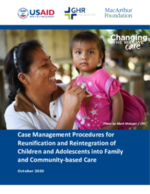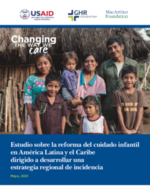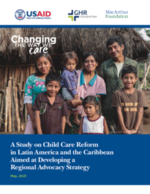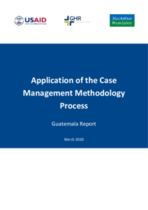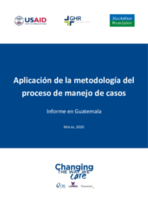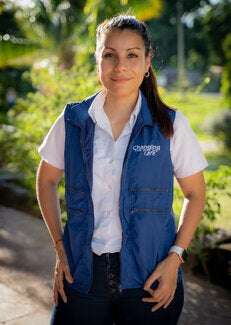
Background Information
Vanesa holds a Bachelor’s degree in Psychology and a Masters in Child and Adolescent Development Management.Vanesa has also worked with Mercy Corps, where she oversaw and coordinated community and municipal work with youth, women and children aimed at violence prevention and community strengthening. She previously worked with the government within the Attorney General's Office, where she was responsible for interviewing and conducting psychological evaluations of children, adolescents and adults and was a part of the team in which "rescues" were made, for children whose rights to protection had been violated. Similarly, Vanesa was responsible for providing group and individual therapy for female child survivors of sexual violence in a public residential care facility. Vanesa has also been an auxiliary teacher responsible for the supervision of practice for students studying Social Psychology in the municipality of Amatitlán, where she was in charge of the coordination, supervision and orientation of the group.
Vanesa cuenta con un Profesorado de Enseñanza Media en Psicología, con una Licenciatura en la misma área y es Magister en Gestión del Desarrollo de Niñez y Adolescencia. A lo largo de su carrera, también ha trabajado con Mercy Corps, donde supervisó y coordinó el trabajo comunitario y municipal para la gestión de proyectos en favor de jóvenes, mujeres y niños, en prevención de la violencia y fortalecimiento de comunitario. También ha trabajado con el Estado, en la Procuraduría General de la Nación (PGN), donde le correspondía entrevistar y realizar evaluaciones psicológicas a niños, niñas, adolescentes y adultos y formaba parte del equipo en que se hacían “rescates”, en defensa del bienestar de la niñez y la adolescencia del departamento de Sacatepéquez, Guatemala. De igual forma, ha realizado trabajo psicosocial, consistente en terapias grupales e individuales con niñas víctimas de violencia sexual, en el Hogar Solidario Virgen de la Esperanza en San José Pinula, donde le correspondió trabajar con jóvenes que tenían algún conflicto con la ley. Vanesa ha sido docente auxiliar en la supervisión de práctica social comunitaria de los alumnos de la carrera de Psicología Social en el municipio de Amatitlán, en Guatemala, donde tuvo a su cargo la coordinación, supervisión y orientación del trabajo grupal e individual de los estudiantes.
Our Interview With Practitioner
I see each experience as an opportunity to learn and improve personally, professionally and academically. I consider that having the attitude and willingness to listen and learn from others are key to developing our skills and abilities.
Veo cada experiencia como una oportunidad de aprender y mejorar de forma personal, laboral y academica; considero que la actitud y la dispocisión de escuchar y aprender de otros son clave para poder desarrollar nuestras competencias y habilidadades.
Work should be done to strengthen families and communities and create social and special services to prevent unnecessary family separation and achieve healthy and sustainable family reintegration. The articulation of actors is possible to achieve sustainable processes in favor of children and adolescents as long as there is an active participation of all those involved and the objective of favoring children and adolescents.
Se debe trabajar en el fortalecimiento de las familias y las comunidades si se quiere prevenir la separación familiar innecesaria y lograr una reintegración familiar saludable y sostenible. Es posible la articulación de actores para lograr procesos sostenibles en favor de la niñez y adolescencia siempre y cuando exista una participación activa de todos los involucrados y el objetivo de favorecer a la niñez y adolescencia.
Coaching and exchange of experiences and learning with experts on the subject of case management, family strengthening and family care. Learning from documented experiences of case management and family strengthening in other countries.
La asesoría e intercambio de experiencias y aprendizajes con expertos en el tema de gestión de casos, fortalecimiento familiar y cuidado familiar. La experiencia documentada de la gestión de casos y fortalecimiento familiar en otros paises.
“My principal motivation for working with children and adolescents is the opportunity to make a positive change in their lives.”
“Mi principal motivación de trabajar con niños, niñas y adolescentes es poder tener la oportunidad de hacer un cambio positivo en sus vidas.”
Intervention with families must be comprehensive and specific at the same time. The strengths, risk factors and protection of each case must be considered in the design of any intervention that seeks to support families and children and adolescents. Support for families should also done within a holistic approach, thinking about all spheres of family care but also all the phases that a family goes through and the roles they have in society and the community. It is from this perspective that interventions can be designed that favor family preservation and the prevention of unnecessary separation.
La intervención con las familias debe ser integral y particular al mismo tiempo, se debe considerar las fortalezas, factores de riesgo y protección de cada caso en el diseño de cualquier intervención que busque apoyar a las familias y NNA. El apoyo a las familias tambien debe ser desde un enfoque holistico pensando en todas las esferas del cuidado familiar pero tambien en todas las fases por las que atraviesa una familia y los roles que tienen en la sociedad y comunidad, desde esta perspectiva se puede diseñar intervenciones que favorezcan la preservación familiar y la prevención de la separación innecesaria.
Where They Operate
Key Areas of Work
Languages Spoken
Practitioner Resources
Case Management Procedures for Reunification and Reintegration of Children and Adolescents into Family and Community-based Care was developed together with Secretary of Social Welfare (SBS), the Office of the Child and Youth Advocate (PNA), Guatemala’s Attorney General (PGN), the Judicial Branch (OJ), the National Council of Adoptions (CNA), ASOCRIGUA and Hogar Aldeas de Esperanza. It was informed by Changing the Way We Care’s work in Kenya on the Caseworker’s Guidebook: Case Management for Reintegration of Children into Family or Community-Based Care, adapted to the Guatemalan context.
El estudio llevó a cabo un ejercicio de recopilar prácticas prometedoras de reforma de cuidado infantil por parte de diversos actores clave en la región de América Latina y el Caribe.
This study presents a detailed overview of promising practices in child care reform by different implementers and stakeholders in the Latin American and Caribbean region.
Los Procedimientos de Manejo de Casos para la Reunificación y Reintegración de los Niños, Niñas y Adolescentes al cuidado Familiar y Comunitaria se desarrollaron a través de talleres participativos en conjunto con la Secretaría de Bienestar Social (SBS), la Procuraduría de la Niñez y la Adolescencia (PNA) de la Procuraduría General de la Nación (PGN), El Organismo Judicial (OJ), El Consejo Nacional de Adopciones (CNA), la Asociación de Hogares Cristianos de Guatemala (ASOCRIGUA) y Hogar Aldeas de Esperanza. Se basó en el trabajo de Changing the Way We Care de Kenia en la Guía para trabajadores sociales: Manejo de casos para la reintegración de niños y niñas en cuidado familiar o comunitaria, adaptada al contexto guatemalteco.
This document presents a summary of the process, results and lessons learned during a demonstration project in the department of Zacapa, Guatemala to implement best practices to prevent unnecessary family separation and strengthen families by identifying primary and specialized social services and bringing those services closer to the families.
Este documento presenta el proceso, los resultados y las lecciones aprendidas durante la implementación de una iniciativa en Guatemala que instale buenas prácticas para la prevención de la separación familiar innecesaria y el fortalecimiento de las familias a través de las búsqueda y acercamiento de servicios sociales primarios y especializados.

